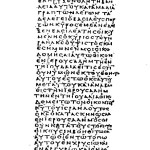 Every year when we prepare to read Parashat Balak, I get questions about why everyone else in the world calls the shady protagonist Balaam but Jews call him Bil’am (בִּלְעָם). I’m happy to get this query because (unlike a lot of other inquiries I get) I can answer it.
Every year when we prepare to read Parashat Balak, I get questions about why everyone else in the world calls the shady protagonist Balaam but Jews call him Bil’am (בִּלְעָם). I’m happy to get this query because (unlike a lot of other inquiries I get) I can answer it.
One needs to start off with the information that the oldest tradition of writing the Hebrew scripture did not indicate short vowels. The name of the magician summoned to curse the children of Israel was written בלעם, or in Roman equivalents BL’M (_’_ here represents ayin, which does not appear in Western alphabets). The standard Jewish pronunciation Bil’am (בִּלְעָם) is found in the Tiberian tradition of pronunciation, which added the dots and lines that we are used to seeing in the Hebrew Bible and indicate the standard pronunciation. The Tiberian tradition dates from roughly 800 – 1000 C.E.

Codex Vaticanus
A much earlier witness to the pronunciation of Hebrew can be found in the Septuagint, which is the Greek translation of the Hebrew Bible dating from probably sometime between 300 B.C.E and the beginning of the Christian Era. The Septuagint transliterated proper names into Greek, and from these we have critical evidence as to how Hebrew was pronounced perhaps a thousand years before the “official” Jewish version was recorded. The Septuagint (which we will abbreviate as LXX going forward) transliterates בלעם as Βαλαὰμ, which would be Balaam in Roman characters. Because the LXX is adopted by Greek speaking Christians and becomes the basis for the Latin and other more popular versions of the Bible, most of the world says Balaam while Jews say Bil’am.
An instinctual reaction of Jews is to consider the Greek-based Balaam as a corruption. Part of that defensiveness flows from the fact that the LXX was often used to criticize the Jewish tradition of scripture, and yes, it does grate a bit have our indigenous Hebrew scripture corrected according to a Greek translation. That the LXX survived primarily in the Christian tradition does not help matters. And finally, it can be pointed out that since Greek has fewer consonants than Hebrew there is in fact a potential for corruption. Take as an example יעקב (ya’aqob) in which two of the four consonants do not exist in Greek (the ayin and the quf) leading to Ιακωβος (yakobos). בלעם itself has an ayin that does not go into the Greek as a consonant, but is reflected instead in the lengthening of the vowel of the second syllable (Balaam).
But with all of these qualifications, it is likely that the most prominent difference between the standard Jewish pronunciation (Bil’am) and that of the rest of the world (Balaam) is the vowel of the first syllable (i versus a), and in this instance it seems that the Greek transliteration does preserve the older form. There is well-known tendency in Semitic languages for the short vowel a in CaCCaC (C = a consonant) to change to i CiCCaC. This is often referred to as “attenuation” as the journey from a to i is a shortening. This is considered to have happened early on in Hebrew with the prefixes for the verb (yiqtul in Hebrew but yaqtul in older forms – the ya– prefix is preserved in Arabic), but also to be an ongoing process that occurred later in nouns. There are many examples among proper names. For example Mary Magdalene (Μαρία ἡ Μαγδαληνήis) was called Magdalene after her hometown which was Magdal or ‘tower’. The word for tower in Tiberian Hebrew is Migdol – so the theory would be that sometime after the name was recorded in Christian Scripture the pronunciation in Hebrew (through this phenomenon of attenuation) changed from Magdal to Migdal (and on to Migdol). The name Mary itself probably reflects the original a vowel of Maryam – realized in Tiberian Hebrew as Miryam. Likewise, Samson/Shimshon. Our best conjecture then is that at the time of the LXX, the pronunciation was Bal’am which attenuated to Bil’am by the time of the Tiberians.
I know, pretty cool. We take away from this that even while the pronunciation of the Torah was pretty conservative over a very long time (Bal’am to Bil’am over maybe 1000 years!), things are not completely static. I use this example to make two further points: The first is that even though the Septuagint is thought of as an external book for Jews it did not start off that way. Though it became Christian scripture it cannot be considered Christian scripture in origin, because it largely predates Christianity. There are other contexts in which this is important to keep in mind. The second point is that our fidelity to the Tiberian pronunciation does not hang on whether it is the “original” way of pronouncing Hebrew. The enterprise of setting the proper vocalization of the Bible was conducted in an environment that formally recognized the existence of variants, of which decisions had to be made as to which one to use. We pass over the alternatives when we read because we have to, not because they are not there. Someone who came into a synagogue and pronounced Balaam instead of Bil’am would be rightly told to stop – not because his theory of historical phonology is off, but because we have an agreed tradition of how to pronounce that does not change in the face of scholarship. I think that maintaining this duality of practice and theory is one of the things that permits outside learning and scholarship to thrive within Judaism, but that is a topic for another post.




